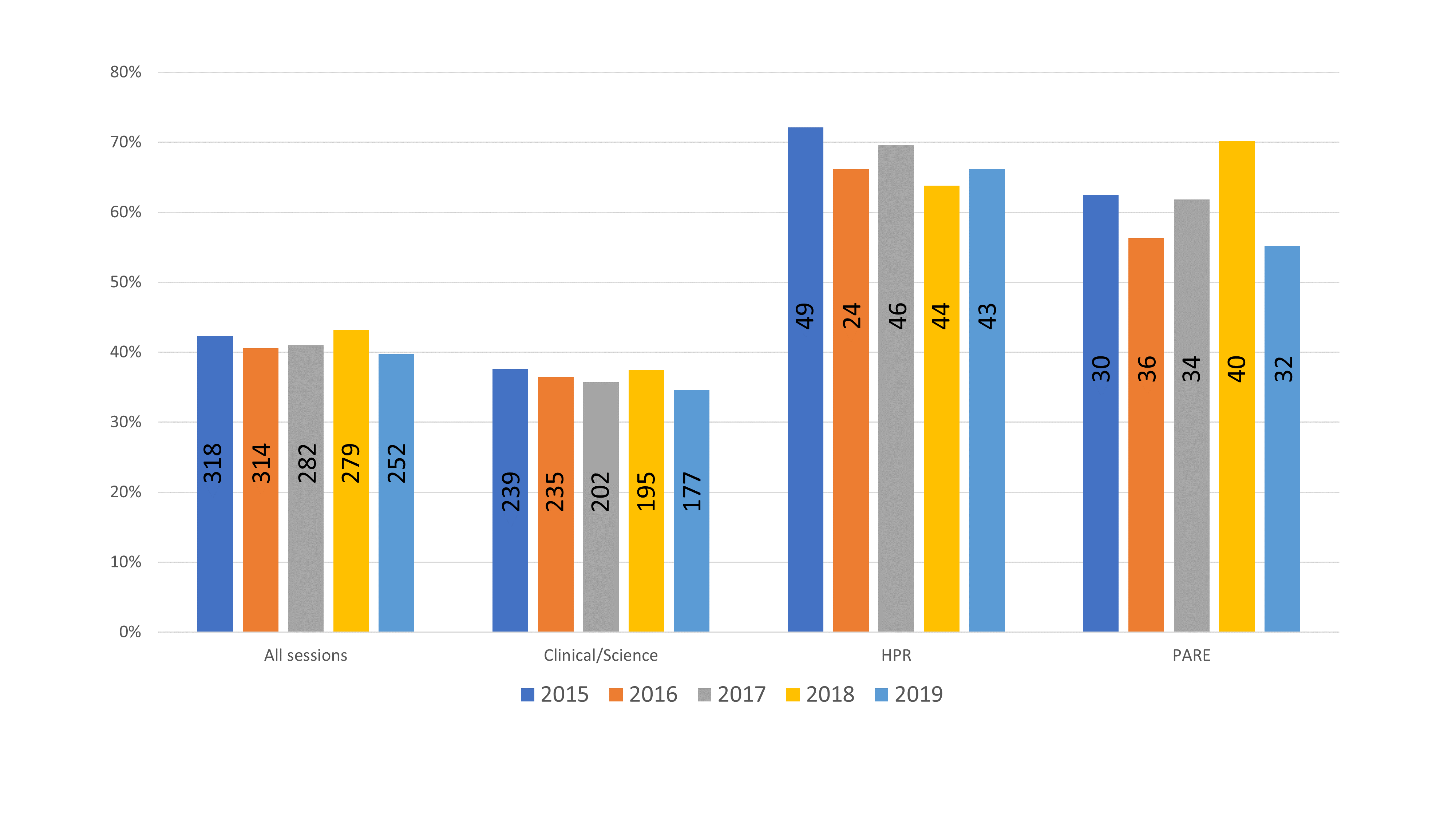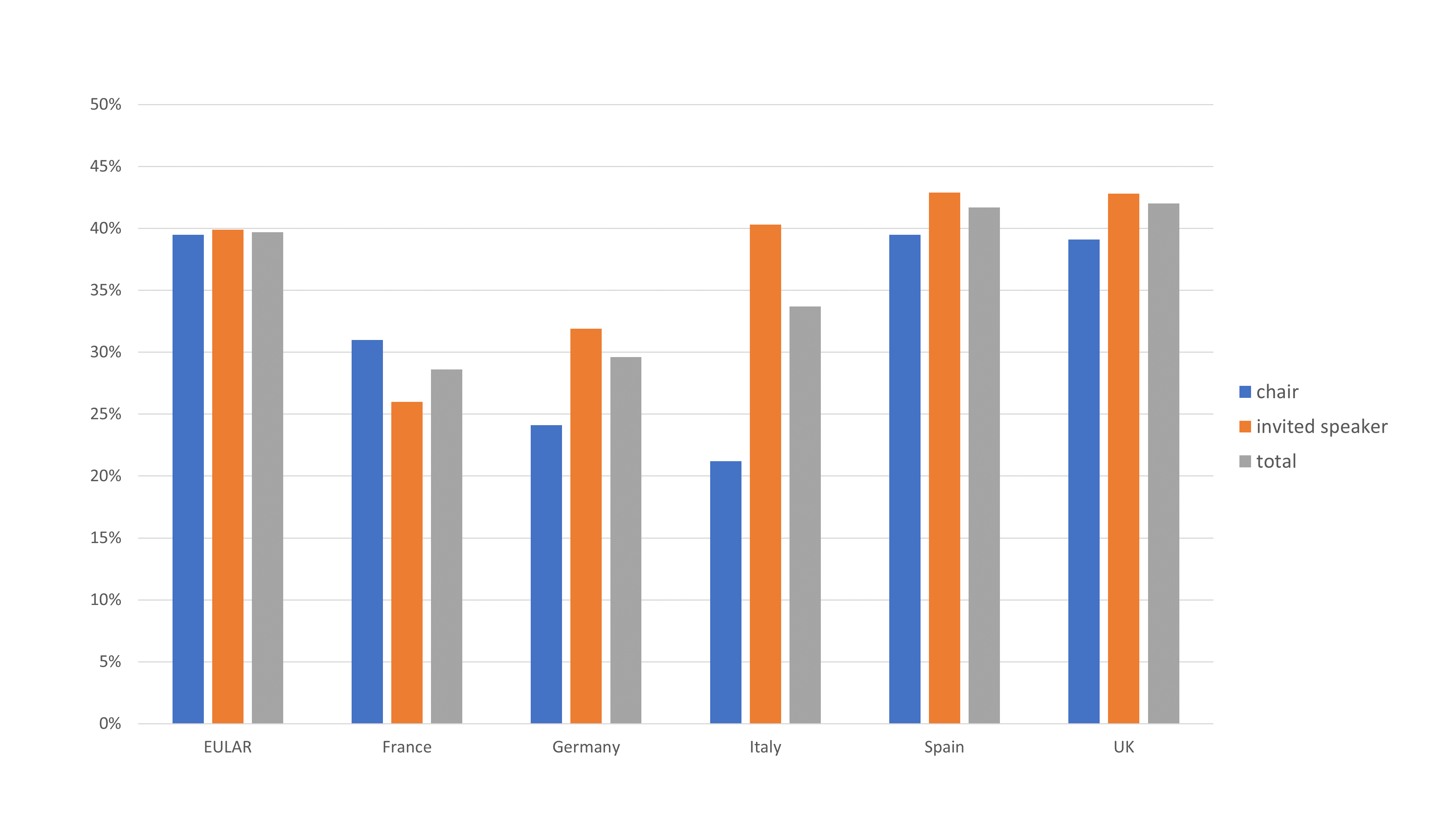Session Information
Date: Monday, November 9, 2020
Session Type: Poster Session D
Session Time: 9:00AM-11:00AM
Background/Purpose: While increasing numbers of women are choosing rheumatology, they remain underrepresented in academic medicine, particularly in senior leadership roles. The reasons for this are multifactorial but increased visibility of women leaders as role models has been proposed as one of the solutions. National and international academic congresses could promote gender equity among speakers.
In recent American College of Rheumatology (ACR) Annual Meeting, 42.8% of speakers and moderators were women in 2017, versus 47.0% in 2018 (1) and 49.1% in 2019 (personal communication). Such data were not available in Europe. The purpose of this study, within the remit of the EULAR Gender Equity Taskforce (2), was to describe the proportion of women invited as moderators or speakers to the European League Against Rheumatism (EULAR) Annual Congresses and National Congresses in Europe.
Methods: Using published congress materials, we determined the proportions of women included in the congresses as either moderators or invited speakers, for EULAR (2015-2019) and 2019 national congresses in France, Germany, Italy, Spain and UK. Individual speakers could be counted multiple times, if they had multiple roles within each congress. For EULAR congresses, we further categorized by Clinical/Science, Health Professionals in Rheumatology (HPR) and People with Arthritis and Rheumatism (PARE) sessions.
Results: The proportion of combined women speakers and moderators at EULAR between 2015 and 2019 varied from 39.7 to 43.2% with no obvious trend over time (Fig 1). Proportions of women moderators and invited speakers were similar. There were much greater proportions of female speakers in the HPR and PARE sessions (over 50% consistently) but these sessions represent < 30% of the EULAR congress invitations (Fig 1). Representation of women at national meetings in France and Germany appeared lower than that in Spain, the UK and at EULAR (Fig 2).
Conclusion: Women account for approximately 40% or less of invited moderators and speakers at the European congresses reviewed, whilst many national congresses are lower. A comparison with the available historical data on women moderators at EULAR in 2003 (16%) and in 2004 (19%) indicates formidable change over the last 15 years (3). Yet, our data does not show an improvement in gender equity in recent years at EULAR congresses, as was seen for the ACR meetings. The establishment of the EULAR Task Force on Gender Equity in Academic Rheumatology signals the commitment of EULAR to accelerate the pace of change in Europe.
- Monga K et al. ARD. 2020; online.
- Ovseiko P et al. ARD 2020; 79 (supp 1): 527
- Lundberg IE et al. A&R 2005;52(3):697.
 Fig 1: Proportion of women invited to participate in EULAR sessions, by type of session
Fig 1: Proportion of women invited to participate in EULAR sessions, by type of session
 Figure 2: Proportion of women invited as chairs and Invited Speakers at EULAR and National Congresses in Europe in 2019
Figure 2: Proportion of women invited as chairs and Invited Speakers at EULAR and National Congresses in Europe in 2019
To cite this abstract in AMA style:
Hassan N, van Mens L, Kiltz U, Delgado C, Ovseiko P, Gossec L, Coates L. Gender Equity in Academic Rheumatology – Is There a Gender Gap at European Rheumatology Congresses? [abstract]. Arthritis Rheumatol. 2020; 72 (suppl 10). https://acrabstracts.org/abstract/gender-equity-in-academic-rheumatology-is-there-a-gender-gap-at-european-rheumatology-congresses/. Accessed .« Back to ACR Convergence 2020
ACR Meeting Abstracts - https://acrabstracts.org/abstract/gender-equity-in-academic-rheumatology-is-there-a-gender-gap-at-european-rheumatology-congresses/
